Related Research Articles
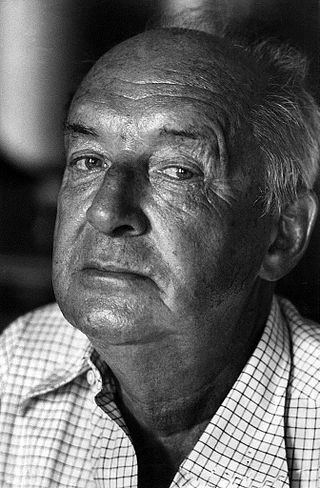
Vladimir Vladimirovich Nabokov, also known by the pen name Vladimir Sirin, was a Russian-American novelist, poet, translator, and entomologist. Born in Imperial Russia in 1899, Nabokov wrote his first nine novels in Russian (1926–1938) while living in Berlin, where he met his wife. He achieved international acclaim and prominence after moving to the United States, where he began writing in English. Nabokov became an American citizen in 1945 and lived mostly on the East Coast before returning to Europe in 1961, where he settled in Montreux, Switzerland.

The Gift is Vladimir Nabokov's final Russian novel, and is considered to be his farewell to the world he was leaving behind. Nabokov wrote it between 1935 and 1937 while living in Berlin, and it was published in serial form under his pen name, Vladimir Sirin.

Despair is the seventh novel by Vladimir Nabokov, originally published in Russian, serially in the politicized literary journal Sovremennye zapiski during 1934. It was then published as a book in 1936, and translated to English by the author in 1937. Most copies of the 1937 English edition were destroyed by German bombs during World War II; only a few copies remain. Nabokov published a second English translation in 1965; this is now the only English translation in print.
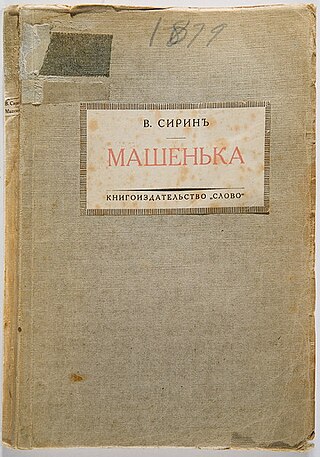
Mary is the debut novel by Vladimir Nabokov, first published under the pen name V. Sirin in 1926 by Russian-language publisher "Slovo".
The Real Life of Sebastian Knight is the first English-language novel by Vladimir Nabokov, written from late 1938 to early 1939 in Paris and first published in 1941. A work centred on language and its inability to convey any satisfactory definition, it has been identified as a forerunner of the postmodernist novel.

The Defense is the third novel written by Vladimir Nabokov after he had immigrated to Berlin. It was first published in Russian 1930 and later in English in 1964.
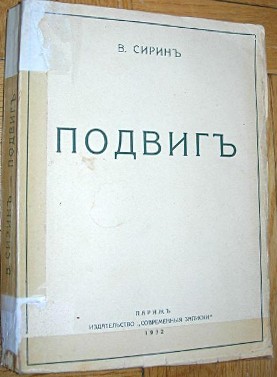
Glory is a Russian novel written by Vladimir Nabokov between 1930 and 1932 and first published in Paris.

Laughter in the Dark is a novel written by Vladimir Nabokov and serialised in Sovremennye zapiski in 1932.

King, Queen, Knave is the second novel written by Vladimir Nabokov while living in Berlin and sojourning at resorts in the Baltic. Written in the years 1927–8, it was published as Король, дама, валет in Russian in October 1928 and then translated into German by Siegfried von Vegesack as König, Dame, Bube: ein Spiel mit dem Schicksal. Forty years later the novel was translated into English by Nabokov's son Dmitri, with significant changes made by the author. A film adaptation only loosely based on the novel followed in 1972.
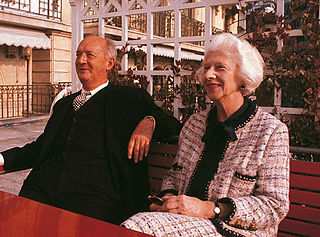
Véra Yevseyevna Nabokova was the wife, editor, and translator of Russian writer Vladimir Nabokov, and a source of inspiration for many of his works.
"Bachmann" is a short story written in Russian by Vladimir Nabokov under his pen name, Vladimir Sirin, in Berlin in 1924. The story details a three-year love affair between the titular Bachmann, a celebrated pianist, and Mme. Perov, a married woman.
"A Nursery Tale" is a short story by Vladimir Nabokov first published in the expatriate Russian newspaper Rul' on 27 and 29 June 1926 and in the book form in The Return of Chorb in 1930. The English translation by the author and his son, Dmitri Nabokov has appeared in 1975 in collection Tyrants Destroyed and Other Stories.

A Russian Beauty and Other Stories is a collection of thirteen short stories by Russian author Vladimir Nabokov. The short stories in this collection were originally written in Russian between 1927 and 1940 under the pseudonym Vladimir Sirin. Before being collated into short story collections, some were published by various European Russian émigré newspapers and magazines.
"The Potato Elf" is a short story written in Russian by Vladimir Nabokov in Berlin where it was first published in the émigré daily Rul in 1929 and then included in the 1929 collection Vozvrashchenie Chorba. It was initially translated into English by Serge Bertensen and Irene Kosinska for publication in Esquire in 1939, and reprinted in A Single Voice. Nabokov then retranslated the story and included it in A Russian Beauty and Other Stories in 1973.
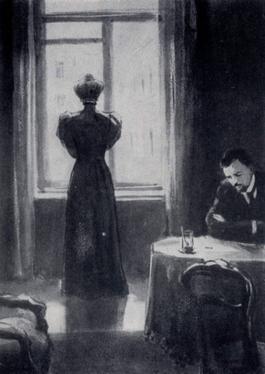
"The Lady with the Dog" is a short story by Anton Chekhov. First published in 1899, it describes an adulterous affair between an unhappily married Moscow banker and a young married woman that begins while both are vacationing alone in Yalta. It is one of Chekhov's most famous pieces of short fiction, and Vladimir Nabokov considered it to be one of the greatest short stories ever written.
This is a list of works by writer Vladimir Nabokov.
"A Matter of Chance" is a short story by Vladimir Nabokov written in Russian under his pen name Vladimir Sirin in Berlin in 1924. It was rejected by the newspaper Rul and first published by the émigré magazine Segodnya in Riga. In 1974 it became part of a collection of thirteen stories called Tyrants Destroyed and Other Stories published by McGraw-Hill.
"Details of a Sunset" is a short story by Vladimir Nabokov written in Russian under his pen name Vladimir Sirin in Berlin in 1924.
Maschenka is a 1987 international film adaptation of the debut novel by Vladimir Nabokov, first published under his pen name V. Sirin in 1926. The film was directed by John Goldschmidt from a screenplay by John Mortimer and stars Cary Elwes as Ganin and Irina Brook as Maschenka.
"An Affair of Honor" is a short story by the novelist Vladimir Nabokov, first published in 1927.
References
- ↑ Robert Meyer. Nabokov: A Case Study in the Art of Translation Archived 2007-09-12 at the Wayback Machine , accessed 04-29-2008
- ↑ Matt A. Christie. The White Line: on Nabokov's Female Characters [ dead link ], accessed 04-30-2008